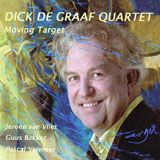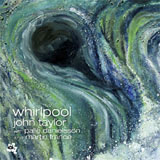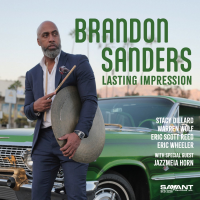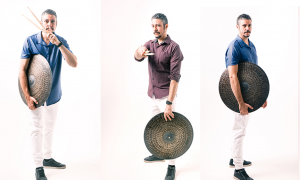Home » Jazz Articles » Interview » Dr. Lonnie Smith: Organ Guru
Dr. Lonnie Smith: Organ Guru
The young players, as long as they're playing from the heart and really meaning it, ...they can take [jazz] and keep it going on.
—Dr. Lonnie Smith
 Okay, let's start this off with a brief word association test. I'll give you a word, and you respond with the first thing that comes to mind. The first word is "music." Hopefully, most of you thought of "jazz" since that's why you're here—to read about jazz and the musicians that play it.
Okay, let's start this off with a brief word association test. I'll give you a word, and you respond with the first thing that comes to mind. The first word is "music." Hopefully, most of you thought of "jazz" since that's why you're here—to read about jazz and the musicians that play it.
Alright, that was easy enough. Let's move on. The next word in this test is "organ." I assume the first word that came to mind for many of you was "donor." Nice job! You should be congratulated. But that's not quite what I was going for on this one. Some of you probably thought of the word "church." Those of you who did obviously made the connection between "organ" and music. And veteran jazz enthusiasts may have even made a connection between "organ" and the Hammond B-3, which is exactly what I was hoping for. But it's likely that many younger jazz fans have never even had the pleasure of hearing the Hammond B-3 organ used to play jazz.
In the mid-1970s, interest in the bulky electro-mechanical organ as a jazz instrument began to wane, while attention was being redirected toward the Moog and other more portable electronic synthesizers. Likewise, interest in the music of the jazz organ masters of the day, such as Jimmy Smith, Jack McDuff, and Jimmy McGriff, seemed to diminish as well. And although the use of versatile and light-weight electronic keyboards spread quickly, the electronics industry seemed incapable of developing one which could reproduce the rich, warm sound of the Hammond B-3 (which had long been considered the "gold standard" for jazz keyboards). Perhaps as a result of that inability, during the past decade there has been a resurgence in interest not only in the Hammond B-3, but also in the artists talented enough to take full advantage of the B-3's extraordinary capabilities.
Many would agree that the number of truly gifted jazz organists now performing can be counted on one hand. Certainly that short list would include the exceptional father and son duo of "Papa" John and Joey DeFrancesco. But there is also another B-3 virtuoso who is an obvious choice for inclusion on that list; one whose affinity for the organ began more than forty years ago. His name? Dr. Lonnie Smith, the turban-clad guru of the Hammond B-3 organ, whose talent and enigmatic persona make him a true standout in the world of jazz. For nearly two generations, Smith's music has been enjoyed worldwide and has inspired countless young jazz musicians.
Smith was born on July 3, 1942, in Lackawanna, New York. His earliest years were spent listening to his family sing gospel and spiritual music. "My parents sang, my mother, her mother, her sisters, her brothers, my cousins." Smith himself started as a vocalist before he gained fame as an organist.

Although he is now an extraordinary jazz organist, there was a time, of course, when he knew nothing at all about it. I asked him how he first got interested in playing musical instruments. "I used to look at catalogues as a young kid," he said. "And I used to love to look at the musical instruments, the guitars and things like that." In school, he was assigned to a home room which was held in a music classroom. "Everyone in there, practically, played an instrument. And I didn't! So one day, I picked up my friend's trumpet. I picked up his trumpet and played it before the bell rang. And they couldn't believe it!"
Smith was promptly taken down to the band room where he was introduced to the band teacher. "And he said 'Yes. ...What would you like?' And I said 'I'd love to play an instrument.' He said 'Well, what would you like to play?' I said 'Saxophone.' And he said 'They're all rented out.'"
Smith was quite disappointed, because he knew that his mother (a huge musical influence upon him) loved the saxophone. But then the band teacher offered him a cornet to play. "And I picked that up, and ...I played it." So what happened, on the first day I went to band practice ...I played the song and he thought that was kind of excellent for a newcomer, [who had] never played an instrument. So I went back the second day and he said 'Looks like we have a star in here.' And he put me in the band.
So I started playing in the band the first week. It was strange. So I played trumpet, or cornet. Another friend of mine, he played trombone. And I played his trombone, and [the band teacher] heard me. He said 'If someone's missing, you just come in and play their instrument.' So I could pick it up real fast."
Stop here for a minute, and think about that. Lonnie Smith was obviously a musical prodigy with the ability to excel on whatever instrument he chose. How different would the history of jazz be today if Lonnie Smith had decided to stay with vocals and brass instruments? It boggles the mind! Eventually, though, he managed to obtain an organ.
Smith grew up with sax sensation Grover Washington, Jr. "He was playing in our group as a saxophonist and I was singing. I used to go over to his house and his mom had an organ. But you know I didn't know how to mess with it. Just a little bit, you know, just pickin' with the instrument. But anyway, my brothers and I used to sing, and they played.
So one day I went to this music store. I used to go in there all the time. But I stayed in there everyday until closing time. And Art Kubera owned the music store and he said 'Can I ask you a question, son?' And I said 'Yes sir.' He said 'Why do you come in everyday until closing time?' I looked him straight in the eye and said 'Sir, if I had an instrument, I could work. If I could work, I could make a living.' And everyday I would go in there, and one day I went in and ...he closed the store up and he told me to come with him. And I went with him to his house [in the back of the store], and ... there was an organ! And, my eyes lit up, and he said 'If you can get this out of here.... it's yours!' I got it, and I haven't looked back since!"
This was a turning point in Lonnie Smith's life. He had found his instrument And, in the process, had also found his "calling." He rapidly began to learn and grow as an organist, quickly gaining local notoriety and fans. Smith was soon playing at The Pine Grill in Buffalo, where he was noticed by a number of jazz greats including Jack McDuff, Lou Donaldson, and agent Jimmy Boyd. In 1966, he joined with a talented young guitarist who was a member of Jack McDuff's band. That guitarist's name was George Benson. Together, the two formed The George Benson Quartet featuring Lonnie Smith, and both were quickly signed to recording contracts with Columbia Records. Shortly afterward, Smith and Benson recorded a tune with Lou Donaldson for Blue Note Records entitled "Alligator Boogaloo." Smith recalls that "the song did so well ...that they wanted me over there. So I went to Blue Note Records."

Since 1969, when Down Beat Magazine named him "Top Organist" of the year, Smith has consistently been a leading force in jazz. He has been recorded on more than seventy albums and has played with nearly everyone that comes to mind including Dizzy Gillespie, Grover Washington Jr., King Curtis, Joe Lovano, Lou Donaldson, David "Fathead" Newman, Bennie Maupin, George Benson, Randy Brecker, Kenny Garrett, Jimmy McGriff. And the list goes on and on. And as evidence of his continuing prowess on the keyboards, he was named 'Organ Keyboardist of the Year' in 2003, 2004, and 2005 by the Jazz Journalists Association.
Dr. Smith briefly discussed his album Jungle Soul. "When I started on that particular CD ...you know you usually start out with one song, and when you play that song, it kind of sets the mood for other songs. And, we had a "feel" with the producer and the fellas, and we came up with the rest of the CD. The producer's a guitarist himself, Matt Balitsaris, over at Palmetto Records. ...I stuck close to the theme."
The album features distinctive African rhythms and instruments on several songs, but also delivers a strong dose of funky soul on such classics as Marvin Gaye's "Trouble Man." And for those readers whose jazz experience may not yet include an appreciation for the organ as a jazz instrument, please listen to "Witch Doctor" from this same album. You'll hear jazz as only Dr. Lonnie Smith and the Hammond B-3 can deliver it.
You might think that after putting together another album, touring Europe, and playing the renowned Village Vanguard and other U.S. venues, there would necessarily be some down-time squeezed into Dr. Smith's schedule. Not a chance. Smith is very intent on giving back and helping others, through the Jazz Foundation of America and other charities. On this topic, he commented, "I've done some things in New Orleans for that, and it helps. And, it's a great thing.
"And I'd love to do something for the Jazz Foundation," he continued. "Wendy [Oxenhorn, Executive Director] and I have been talking and we're trying to ...get a retirement home for jazz musicians. I'm working hard on it, you know, trying to help with that, and trying to get more people involved. Because, you see, most jazz musicians ...do not have any insurance. Nor can they buy a home because they can't prove [their income]. And their job is not steady as per se someone who has a regular job. It's something that they do from the heart. Yeah, I've done some, which is great to do, as long as you're giving back, and you can give the people hope and help also."

Smith went on to describe not only the plight of musicians in general, but also the joy of being a musician. "You know what people really think of musicians! 'Get you a real job!' You know, like it isn't a real job. It's a passion, and you make people happy all around the world. So you can't beat that! I don't think you can, with what they would call a regular job. If you're doing some kind of job where you're making people happy, and you're not angry every time you leave work, then you've got something you love to do."
When asked what it is like working doing his favorite thing, he quickly responded "I don't even know I'm doing it. Because what happens when I play, I'm into another world. It's ...it's like electricity. It goes through my foot to the top of my head. It's so exciting. ...It's a rush for me. It's a passion. It's my love. You know, first love, second love, third love. It's like something that I had to do. I didn't choose it. It chose me."
Toward the end of our discussion, I asked Smith how he felt about playing with younger musicians. After all, an accomplished jazz musician could easily get frustrated with the "wet-behind-the-ears" younger generation. But not Lonnie Smith. He believes in "passing the baton" to younger jazz musicians, "because they are the future. And because, see, we're getting on up there [in age] and ...the young players, as long as they're playing from the heart and really meaning it, ...they can take [jazz] and keep it going on."
And what is his advice to young players? "Play how you feel. That's the way I play. If I'm happy, that's what I play. When you're sad, play just that. That's the beauty in it. I tell my students 'play your day.' If you had a wonderful day, play that. If you had a fair day, play that, and you'll be in tune to yourself! Play life! Yeah... play life!"
Selected Discography
Dr. Lonnie Smith, Jungle Soul (Palmetto, 2006)
Dr. Lonnie Smith, Too Damn Hot! (Palmetto, 2004)
Lonnie Smith, Afrodesia (LaserLight, 1975)
Lonnie Smith, Live at Club Mozambique (Blue Note, 1970)
Lonnie Smith, Think! (Blue Note, 1968)
Photo Credit
Top Photo: Mikayla Gilbreath
Bottom Photo: Mark Ladenson
Tags
PREVIOUS / NEXT
Support All About Jazz
 All About Jazz has been a pillar of jazz since 1995, championing it as an art form and, more importantly, supporting the musicians who make it. Our enduring commitment has made "AAJ" one of the most culturally important websites of its kind, read by hundreds of thousands of fans, musicians and industry figures every month.
All About Jazz has been a pillar of jazz since 1995, championing it as an art form and, more importantly, supporting the musicians who make it. Our enduring commitment has made "AAJ" one of the most culturally important websites of its kind, read by hundreds of thousands of fans, musicians and industry figures every month.

























